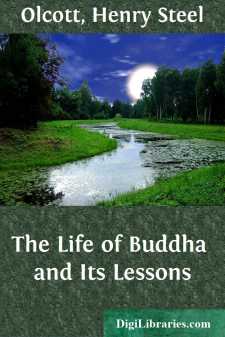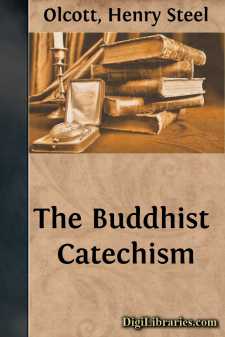Categories
- Antiques & Collectibles 13
- Architecture 36
- Art 48
- Bibles 22
- Biography & Autobiography 813
- Body, Mind & Spirit 142
- Business & Economics 28
- Children's Books 17
- Children's Fiction 14
- Computers 4
- Cooking 94
- Crafts & Hobbies 4
- Drama 346
- Education 46
- Family & Relationships 57
- Fiction 11829
- Games 19
- Gardening 17
- Health & Fitness 34
- History 1377
- House & Home 1
- Humor 147
- Juvenile Fiction 1873
- Juvenile Nonfiction 202
- Language Arts & Disciplines 88
- Law 16
- Literary Collections 686
- Literary Criticism 179
- Mathematics 13
- Medical 41
- Music 40
- Nature 179
- Non-Classifiable 1768
- Performing Arts 7
- Periodicals 1453
- Philosophy 64
- Photography 2
- Poetry 896
- Political Science 203
- Psychology 42
- Reference 154
- Religion 513
- Science 126
- Self-Help 84
- Social Science 81
- Sports & Recreation 34
- Study Aids 3
- Technology & Engineering 59
- Transportation 23
- Travel 463
- True Crime 29
The Life of Buddha and Its Lessons
Categories:
Description:
Excerpt
The thoughtful student, in scanning the religious history of the race, has one fact continually forced upon his notice, viz., that there is an invariable tendency to deify whomsoever shows himself superior to the weakness of our common humanity. Look where we will, we find the saint-like man exalted into a divine personage and worshipped for a god. Though perhaps misunderstood, reviled and even persecuted while living, the apotheosis is almost sure to come after death: and the victim of yesterday's mob, raised to the state of an Intercessor in Heaven, is besought with prayer and tears, and placatory penances, to mediate with God for the pardon of human sin. This is a mean and vile trait of human nature, the proof of ignorance, selfishness, brutal cowardice, and a superstitious materialism. It shows the base instinct to put down and destroy whatever or whoever makes men feel their own imperfections; with the alternative of ignoring and denying these very imperfections by turning into gods men who have merely spiritualised their natures, so that it may be supposed that they were heavenly incarnations and not mortal like other men.
This process of euhemerisation, as it is called, or the making of men into gods and gods into men, sometimes, though more rarely, begins during the life of the hero, but usually after death. The true history of his life is gradually amplified and decorated with fanciful incidents, to fit it to the new character which has been posthumously given him. Omens and portents are now made to attend his earthly avatÐÐÐÐÐâÐÐra: his precocity is described as superhuman: as a babe or lisping child he silences the wisest logicians by his divine knowledge: miracles he produces as other boys do soap-bubbles: the terrible energies of nature are his playthings: the gods, angels, and demons are his habitual attendants: the sun, moon, and all the starry host wheel around his cradle in joyful measures, and the earth thrills with joy at having borne such a prodigy: and at his last hour of mortal life the whole universe shakes with conflicting emotions.
Why need I use the few moments at my disposal to marshal before you the various personages of whom these fables have been written? Let it suffice to recall the interesting fact to your notice, and invite you to compare the respective biographies of the BrÐâÐÐhmanÐÐÐÐical KrÐÐÐÐsÐÐÐÐhnÐÐÐÐa, the Persian Zoroaster, the Egyptian Hermes, the Indian GautÐÐÐÐama, and the canonical, especially the apocryphal, Jesus. Taking KrÐÐÐÐsÐÐÐÐhnÐÐÐÐa or Zoroaster, as you please, as the most ancient, and coming down the chronological line of descent, you will find them all made after the same pattern. The real personage is all covered up and concealed under the embroidered veils of the romancer and the enthusiastic historiographer. What is surprising to me is that this tendency to exaggeration and hyperbole is not more commonly allowed for by those who in our days attempt to discuss and compare religions. We are constantly and painfully reminded that the prejudice of inimical critics, on the one hand, and the furious bigotry of devotees, on the other, blind men to fact and probability, and lead to gross injustice. Let me take as an example the mythical biographies of Jesus. At the time when the Council of Nicea was convened for settling the quarrels of certain bishops, and for the purpose of examining into the canonicity of the three hundred more or less apocryphal gospels that were being read in the Christian churches as inspired writings, the history of the life of Christ had reached the height of absurd myth. We may see some specimens in the extant books of the apocryphal New Testament, but most of them are now lost. What have been retained in the present Canon may doubtless be regarded as the least objectionable. And yet we must not hastily adopt even this conclusion, for you know that Sabina, Bishop of Heracha, himself speaking of the Council of Nicea, affirms that "except Constantine and Sabinus, Bishop of Pamphilus, these bishops were a set of illiterate, simple creatures that understood nothing"; which is as though he had said they were a pack of fools....



